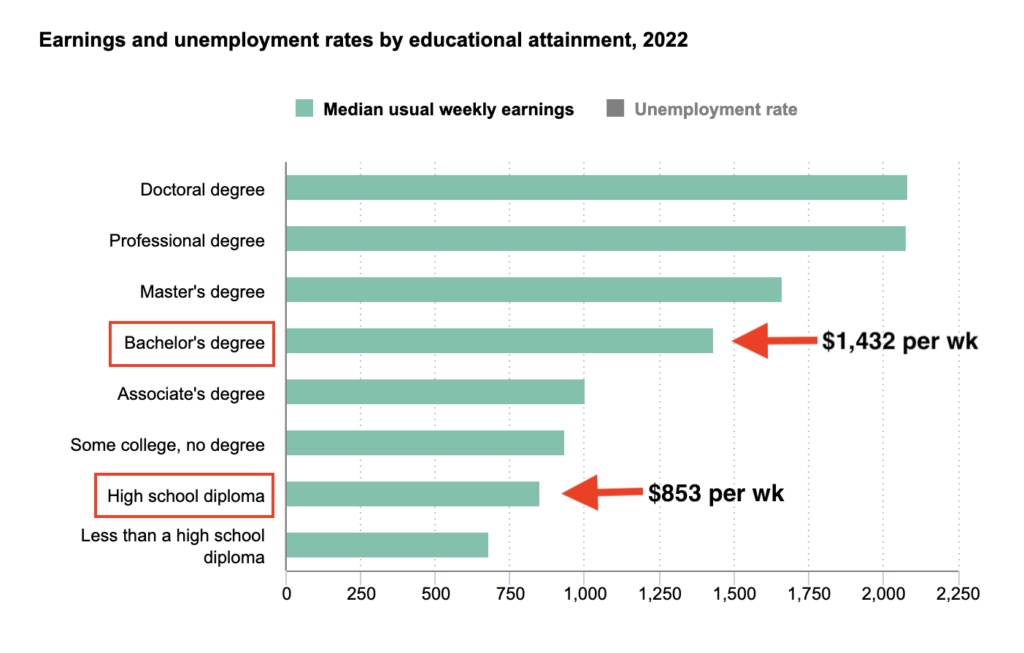It's a tough decision to make: should you go to college? The costs are high, and the job prospects once you graduate seem uncertain.
Each family must weigh the pros and cons of attending college based on their unique circumstances. It's a significant decision that can impact your career and financial future.
In this post, we'll look at the pros and cons of college and explore your options. From the benefits to the drawbacks, we'll give you the info you need to decide if a four-year degree is right for your teen. Plus, we'll look at college alternatives and go over financial aid options. So, let's help you make the right decision to kickstart your career!
The Cost of College
Let's face it, college can be expensive, and that's especially true for private colleges. Tuition can range from $50,000 a year and up, and that's just the beginning. Then there's room and board, textbooks, and supplies, which can all add significantly to your student's college costs.
Return on Investment (ROI)
In considering whether to attend college, it is essential to evaluate ROI carefully: will your investment in tuition fees yield enough benefits down the line?
You'll need to consider factors such as projected salary after graduation, job market trends for your chosen field, and how quickly you could realistically expect to pay off any student loans taken out for tuition costs.
With this information, you can make an informed decision on which school offers the best value for your money.
Finding Ways to Pay for College
Don't panic. There are ways to manage the high cost of college:
- Scholarships: Apply for scholarships based on academic achievement or other criteria like community service involvement or leadership roles. Check out our scholarship database for opportunities.
- Financial Aid: Federal financial aid programs like Pell Grants and subsidized loans can help. Fill out the FAFSA to apply.
- Earned Income Tax Credit (EITC): This federal tax credit could lower your family's taxes by thousands if they have low-to-moderate income from working.
- American Opportunity Tax Credit (AOTC): Another federal tax credit designed to offset some higher education expenses, including course materials required for study.
Don't let the cost of college scare you away. Do not be intimidated by the price tag of college; most students will receive some amount of financial aid to help pay for college. Of course, how much you receive depends on you and your family's financial circumstances.
RELATED: How to Use the Net Price Calculator
5 Benefits of Attending College
When considering the question, "is college worth it?", it's important to weigh both sides of the argument. Considering the pros of a college education, let's explore some potential benefits.
Earning Potential
The most obvious benefit is increased earning potential. According to data from the Bureau of Labor Statistics (BLS), individuals with a bachelor's degree earn significantly more than those without. So, if you want to make bank, college is the way to go.
The chart below shows the median usual weekly earnings for a high school student at $853.00 compared to that for a Bachelor's degree holder of $1,432.

Career Opportunities
A college degree can open doors to career opportunities that may not be available otherwise. Many professions require at least a bachelor's degree for entry-level positions, and further advancement often necessitates additional higher education. So, if you're aiming to advance professionally, college is the way to go.
Skill Development
College isn't just about preparing for a specific job; it also provides an opportunity to develop essential skills like critical thinking, problem-solving, communication, and teamwork - all valuable assets in today's competitive job market.
College classes are designed to help students think on a deeper level and use problem-solving skills to develop new perspectives on various topics.
Potential Networking Opportunities
In addition to academic knowledge, colleges offer numerous networking opportunities through internships, work-study programs, and campus organizations, which could prove beneficial in future professional pursuits. If college is the route to take for increasing your network, then don't hesitate.
Broadened Perspectives
Finally, college is the perfect place to grow as a person. It’s an opportunity to learn and explore, to develop as a person, and to expand your world view.
The classes you take in college give you better insight into the world and different perspectives – you’ll come away with a better understanding of history, culture, and even science and the humanities. You’ll be exposed to new ideas and different ways of thinking. Plus, the friendships you make and experiences you have in college will stay with you for the rest of your life.
5 Reasons College Might Not Be Worth It
College has its perks, but it's not for everyone. Here are five reasons a traditional 4-year college might not be worth the money.
The High Cost of Tuition – Burden of Student Loans
Many might say one of the cons of going to college is the cost. Tuition costs have seen a dramatic increase of 213% since 1988, according to CNBC, making college unaffordable for many families. According to CNBC, tuition has increased by 213% since 1988. Even with assistance, students may end up with large loans that take a long time to settle.
As a result, many college grads are left with a hefty sum of student loan debt. According to Student Loan Hero, Americans owe over $1.7 trillion in student loans - an average debt load of nearly $30,000 per borrower. The burden of this debt can limit graduates' options as they start their careers.
However, don’t write off college because of the costs. Instead, consider some low-cost options like starting out at a two-year college or attending college while living at home. Staying on campus might not be worth the extra money either.
And, don’t forget to apply for financial aid and scholarships.
Limited Job Prospects After Graduation
A degree doesn't guarantee a job after graduation. Many graduates struggle to find work in their field and end up underemployed or working jobs that don't require a degree. It's important to research job prospects in your field before committing to a degree.
One of the best ways to enhance your chances of getting hired, is taking advantage of the career services offered on campus. The career offices have a treasure trove of resources that can boost your employability prospects.
The Opportunity Cost of Attending College
It's definitely worth considering all the pros and cons of college, to figure out whether it makes sense to put in the time commitment. After all, college can take up to four years or more, which is a lot of time. That time could be spent getting hands-on experience in the workplace or launching your own tech startup.
Putting in the time for college can pay off though, by increasing your employability and allowing you to compete for higher paying jobs. Also, with a college degree in hand, you are less likely to be unemployed.
Careers That Don't Require A Degree
Many high-paying careers do not require a bachelor's degree. Trades such as plumbing and electrical work offer good salaries without the need for expensive education. There are also numerous opportunities in tech fields like coding and web design where skills matter more than formal education.
The Stress Factor
Students in college confront hefty levels of tension, caused by scholastic stress, social problems, monetary concerns and more. Stress can lead to serious psychological issues, such as anxiousness and despair. As a result, many students drop out of college with student debt and no degree.
It's important to prioritize your mental health and consider strategies to reduce your stress levels. If you feel you need a break between high school and college, consider taking a gap year instead of passing on college altogether.
Alternatives to a Four-Year College or University
While we addressed some "cons" above to attending college, we believe you will need some amount of post-secondary education to succeed in today's economy.
Since not every career path requires a traditional four-year degree, here are some alternatives that can save you time and money while still providing the education necessary for your chosen field.
Community College
Community colleges offer two-year associate degrees in various fields, which can be used as stepping stones towards a bachelor's degree or directly into the workforce. They often have lower tuition rates than universities, making them an affordable option for many families.
If you are pursuing a career that only requires a two-year degree, then this is a perfect option for you. Some high paying jobs that only require an associates degree include: paralegals, computer network support specialists, respiratory specialists, web developers and electrician.
RELATED: 5 Benefits of Attending a Community College
Certificate Programs
If you're interested in specific trades like culinary arts, automotive repair, or healthcare technology - certificate programs could be right up your alley. These programs provide specialized training without requiring general education courses that aren't relevant to your career goals.
Some careers that might only require a certificate include Emergency Medical Technician, Personal Trainer, Phlebotomist and Medical Assistant.
Vocational Schools
Vocational schools also known as trade schools or technical institutes, focus on job-specific skills rather than broad academic studies. Vocational schools are an ideal choice for those who know their desired career path (for e.g., plumber and electrician) and wish to avoid courses that are not essential to their career path.
Military Service
The military provides valuable life experience along with opportunities for further education through benefits such as the GI Bill. However, this is not an easy decision and should only be considered after understanding all implications involved.
Should You Go To College?
Considering the potential implications of attending college, it's essential to evaluate your options carefully. Let's explore some steps that might help you make this important choice.
Assess Your Career Interests
The initial move in deciding if college is the best fit for you is recognizing what type of job route appeals to you. There are many online tools available that can help identify potential careers based on your skills, interests, and values. Some jobs require a degree while others may only require a certificate.
Consult Your School Counselor
Your high school counselor can provide insight into different colleges, majors, and financial aid opportunities like scholarships or grants which could significantly reduce the cost of attending college.
Check in with your counselor on a regular basis to discuss your college and career goals.
Discuss with Your Parents
College is worth considering for most students, but is not the only path. Have an open and honest conversation with your parents about your interests, career plans, and goals in order to make the best decision.
This decision isn't one that should be made alone; involve your parents in these discussions. Their life experiences combined with their desire for your success will offer valuable perspectives.
Ask yourself these three questions
- What are my goals?
- Do I have a specific career I’m interested in pursuing?
- Will college be useful in helping me achieve these goals?
Wherever you land, remember it's a personal decision. However, you should ensure you're not choosing a path because you perceive it as easier. Remember, "nothing ventured, nothing gained".
Evaluate Financial Considerations
Considering the financial implications of college - from potential earnings to ways to lessen the burden such as aid, scholarships or less expensive schools - is an important part of making this decision.
RELATED: How to Pay For College
It's worth noting there are ways to lessen the burden such as applying for financial aid, winning scholarships or choosing less expensive schools like community colleges before transferring credits towards a four-year university program. Remember, having a degree does tend to increase job prospects overall.
How to Get Financial Aid for College
College is expensive, but don't panic. There are plenty of ways to get financial aid and scholarships to help cover the costs. Here's what you need to know:
Finding Financial Aid Opportunities
Start by filling out the Free Application for Federal Student Aid (FAFSA). This will give you access to federal grants, loans, and work-study funds. Check your state's department of education website for local scholarship opportunities too.
Scholarships: Free Money for College
Apply for scholarships based on academic achievement, community service, or specific talents like athletics or the arts. You can find scholarships in our database of over 1.9 million scholarships.
Tips to Win Scholarships
- Start Early: Some deadlines are up to a year before college starts, so don't wait.
- Diversify Your Applications: Apply for both large and small scholarships.
- Hone Your Essay Writing Skills: Share personal stories that highlight who you are beyond grades.
RELATED: How to Write and Edit Your Scholarship Essay
Aid from Colleges Themselves
Explore the financial aid options available from your college, including merit-based awards and need-based grants; every dollar counts when it comes to reducing costs. Take the time to search the college’s website or talk to the college’s financial aid officer to learn what options are available.
Remember, every dollar counts when trying to reduce costs. Keep researching and applying until you find the right fit financially and academically for you.
FAQs
Is college worth the investment?
It depends on individual goals and circumstances, as college can provide a path to career success but also comes with financial burdens.
However, despite the costs, getting a college degree can be a good investment. For one, it will help prepare you for a career that pays more than if you did not go to college. On average, most college graduates earn when compared to those who only graduated high school.
Is college a waste of time?
There is no universal answer, as some find value in the knowledge gained while others may see more benefit in gaining work experience immediately. However, there are some benefits that you might not be able to put a price on.
College classes are designed to help students think on a deeper level and use problem-solving skills to develop new perspectives on various topics. These skills can be invaluable in the workplace and in life.
Is college right for me?
This is subjective and depends on your career aspirations and financial situation. Consider researching and speaking with professionals in your desired field to make an informed decision.
Conclusion
All in all, attending college is an incredibly rewarding and beneficial experience, but it isn't without its challenges. It's important to research the pros and cons of college beforehand to make sure it's the right fit for you.
You should keep in mind that people who have some amount of post secondary education will have a leg up in this economy. And, someone with a bachelor's degree will on average earn significantly more than someone with only a high school diploma. Also, scholarships and financial aid are available to help reduce your college costs.
College is an important decision to make and one that should not be taken lightly.



